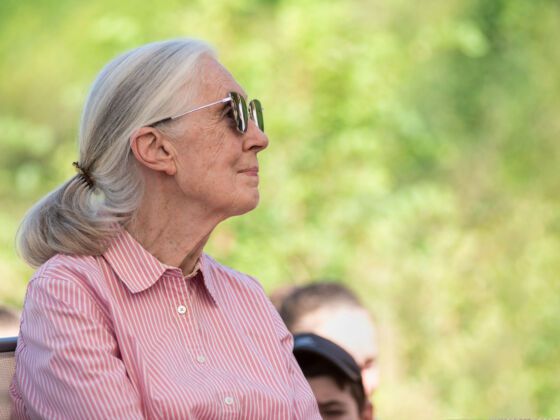Environmentalism focuses on working towards a sustainable, global harmony between people and nature. This requires a passion to protect all wildlife, the ability to inspire, to take bold peaceful actions, and to raise awareness of the necessity of conservation and impact of human activity. Here are 5 inspirational women whose contributions to conservation have benefitted the natural world and our attitude towards it:


Rachel Carson
Rachel Carson was a marine biologist and nature writer during the 1950’s and 60’s. Originally working in the U.S Bureau of Fisheries, she switched to writing full-time, producing her famous works Under the Sea Wind, The Sea Around Us, and The Edge of the Sea; a comprehensive trilogy focusing on all ocean life.
She went on to write her most famous book Silent Spring in 1962 about the devastating effects of synthetic pesticides, leading to greater environmental awareness in the American people as well as facilitating a nationwide ban on DDT and other pesticides, eventually catalysing the creation of the Environmental Protection Agency.
Rachel Carson died in 1964 but was posthumously awarded the American Medal of Freedom, the highest civilian award, by President Carter in 1980. Since her death Carson has also had hiking trails, nature reserves, marine protection areas, research vessels and even schools named after her.
The Rachel Carson Prize was also created to award women who contribute to conservation science and environmental protection. Carson’s life and published works had a major influence on the rising eco-feminist movement at the time.
Virginia McKenna
Virginia McKenna began her career as an actress starring in films such as The Cruel Sea and Born Free. Her conservation efforts were triggered when filming An Elephant Called Slowly with conservationist George Adamson and two elephants, Eleanor and Pole Pole.
The young elephant Pole Pole was gifted to London Zoo after the film was made, but due to poor living conditions died early in captivity. This moved McKenna and her husband Bill Travers to instigate the Zoo Check Campaign, advocating for a higher standard of living in UK zoos, and the campaign playing a pivotal role in the closure of Southampton Zoo in 1985.
The Zoo Check Campaign evolved into the Born Free Foundation, named after the 1966 film where McKenna and Travers portrayed George and Joy Adamson’s efforts to return a lioness to the wilds of Africa. The Foundation now not only encompasses the Zoo Check Campaign, but campaigns dedicated to wolves, dolphins, elephants, bears, primates and big cats, all working towards keeping wild animals in their natural habitats, preventing animal rights abuse and securing animal welfare in the Born Free wildlife sanctuaries.
Jane Goodall
A primatologist specialising in chimpanzees, Goodall conducted a 55-year-long study into their social interactions in the wild. She is considered the world’s leading expert in chimpanzees and is a prominent figure on the Nonhuman Rights Project (NhRP) board.
Jane Goodall’s research in Tanzania’s Gombe Stream National Park played an integral part in recognising the personalities and individuality displayed by chimpanzees, an idea disregarded by the scientific community at the time.
The NhRP works towards granting nonhuman animals legal personhood, recognising the autonomy and self-determination in animals that Goodall saw; the same human qualities required for protecting them from experimentation and/or imprisonment. Cases filed by the NhRP made huge strides in animal rights.
Berta Caceres
Berta Caceres was a Lenca environmentalist and social activist defending the indigenous rights of the Lenca people in Honduras. As a cofounder of the Council of Popular and Indigenous Organisations of Honduras, her activism defended against illegal logging and exploitation of Lenca territories.
Caceres’ most notable action was the grassroots campaign she led against the Agua Zarca Dam, which was earmarked for construction across the sacred Gualcarque River without notifying the Lenca people. The campaign was a success, forcing the construction of the dam to be abandoned, winning her the 2015 Goldman Environmental Prize for grassroots activism.
Her dedication to equality, sustainability and doing the right thing tragically cost her her life; she was murdered in March 2016. Environmentalism is based on the unity of people, coming together to challenge the unsustainable and exploitative actions of those with the power to carry them out. 185 environmentalists were murdered in 2015, many of which were South American countries; 40% of the victims were indigenous people, and 42 of the deaths were related to protests.
Although deeply saddening these deaths have sparked even more solidarity in the worldwide environmentalist movement, with many quoting the South American proverb “They tried to bury us but they didn’t know we were seeds” in response to Caceres’ death.
Mollie H. Beattie
Mollie H. Beattie was the first female director of the U.S Fish and Wildlife Service. Despite only having a term of three years as director, she instated 15 wildlife refuges and successfully reintroduced the Gray Wolf to America’s northern Rocky Mountains.
The U.S Fish and Wildlife Service designated the 8 million acre Mollie Beattie Wilderness in Alaska’s Arctic Wildlife Refuge, the second largest wilderness area in the U.S, in recognition to her contribution to conservation.
Graduating in both philosophy and forestry Beattie could see the clear connection between the natural world and the world we humans had made for ourselves, stating that:
“In the long term, the economy and the environment are the same thing. If it’s un-environmental it is uneconomical. That is the rule of nature.”
If any of these women have inspired you to get involved in helping the environment and/or animals around the world, check out our Terrestrial and Marine Conservation projects.
This article originally appeared on Frontier and is republished here with permission.